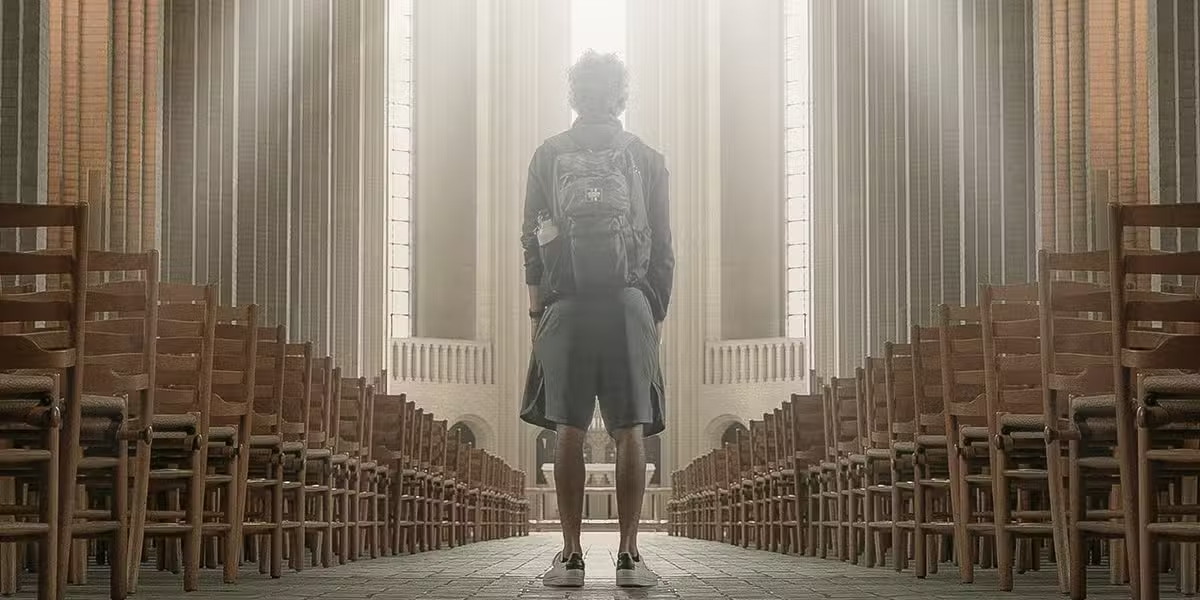Franciscans and Muslims encountered one another during the lifetime of Saint Francis (1181-1226). Indeed, he sent friars to the Holy Land in 1217. Two years later, Crusaders fought Muslim soldiers at Damietta, Egypt, near the mouth of the Nile. At considerable risk, Saint Francis engaged Sultan Malik al-Kamil, their leader, in peaceful dialogue.
What follows is a brief description of that encounter, based on accounts written soon afterward. The Christian and Muslim armies stood opposite each other at close quarters. The sultan had decreed that anyone who brought him the head of a Christian should be rewarded with a gold piece. Francis, however, the knight of Christ, was unafraid and hoped to realize his ambition of dying as a martyr for Christ. Friar Illuminatus accompanied him.
The Muslim soldiers seized them fiercely and dragged them before the sultan. When he asked why they were sent and by whom, Francis replied courageously that they had been sent by God, not by man, to show him and his subjects the way of salvation and to proclaim the truth of the gospel message. Francis proclaimed the triune God and Jesus Christ, the savior of all, with steadfastness, courage and spirit.
When the sultan saw the little friar’s enthusiasm and courage, he listened to him willingly and pressed him to stay with him. Then he offered Francis a number of valuable gifts, but the saint was anxious only for the salvation of souls and refused the sultan’s gifts. The sultan, astonished at Francis’ utter disregard for worldly wealth, felt greater respect than ever for the saint. (In fact, Francis accepted an ivory horn that is displayed in Assisi’s Basilica of St. Francis.)
Bishop Jacques de Vitry, who was a contemporary of Francis, wrote that the sultan “had Francis led back to [the Christian] camp with many signs of honor and with security precautions, but not without saying to him: ‘Pray to God for me, that God may reveal to me the law and the faith that is more pleasing to him.’” (These texts are from Saint Bonaventure’s Life of St. Francis and from Jacques de Vitry’s History of the Orient in St. Francis of Assisi: Omnibus of Sources, St. Anthony Messenger Press, 2008.)
Franciscans today return prayerfully and often to Francis’ encounter with the sultan, viewing it as a starting point and model for their own approach to Christian-Muslim dialogue.
A man of his era, Francis did not anticipate all the insights that scholars today enjoy regarding world religions. He reflected the Christian biases of his time, as is clear from his frequent written references to Muslims as “infidels” and what some would see as an excess of fervor in trying to convert the sultan.
Yet Francis was ahead of his time in the openness, respect and spirit of dialogue that he showed in this daring, nonviolent, peacemaking venture. The sultan gave Francis a safe-conduct letter that allowed him to visit the Holy Land itself.
Fruitful Encounter for Both
Francis learned much from the sultan and from Muslim spirituality. In fact, each man learned from the other—which is what often happens in genuine dialogue. Impressed by Francis’ courage and simplicity, the sultan asked him to pray that he might have a fuller understanding of God’s will.
Changes that Francis later underwent include the following:
New convictions about prayer. During his stay in the Muslim world, Francis could have hardly missed the importance that Muslims give to prayer. Five times a day from the top of a minaret, the muezzin—or prayer caller—publicly invites the faithful to pray. During lengthy discussions with Francis, the sultan probably excused himself for prayers at the muezzin’s signal—an action that must have impressed Francis profoundly.
Once Francis returned to Italy, he wrote a Letter to the Rulers of the People, which says: “See to it that God is held in great reverence among your subjects; every evening, at a signal given by a herald or in some other way, praise and thanks should be given to the Lord God almighty by all the people.”
Nor could Francis have missed the way Muslims prostrated themselves on the earth or bowed to the ground in reverence to the Almighty. In A Letter to a General Chapter, Francis writes, “At the sound of [God’s] name you should fall to the ground and adore him with fear and reverence.” The reason friars are sent all over the world, he adds, is to “bear witness…that there is no other God besides Him”—an expression amazingly similar to the Muslim’s central formula of faith: “There is no other God than Allah!”
An enriched sense of God’s majesty. Muslims have a keen sense of God’s sublimity, majesty, goodness and transcendence over all creatures. They praise God with a beautiful litany of names (99 in all), names such as “The Gracious,” “The Kindly,” “The Beneficent,” “The High One,” “The Merciful,” “The Compassionate,” “The Mighty” and “The Loving.”
This form of praise probably influenced Francis’ own style of prayer, for example, his litany-like “Praises of God” at Mount La Verna: “You are holy, Lord, the only God….You are strong, you are great, you are the Most High, you are almighty….You are Good, all Good, Supreme Good…you are love, you are wisdom. You are humility, you are endurance. You are rest, you are peace….You are our eternal life, great and wonderful Lord, God almighty, merciful Savior.”
A model of peaceful presence “among” Muslims. The respect that both the sultan and Francis showed toward each other must have had a transforming effect on Francis. Not long after his return from Egypt, in Chapter 16 of his Rule of 1221, he describes two ways of going “among” the Muslims:
“One way is to avoid quarrels or disputes and be subject to every human creature for God’s sake (1 Peter 2:13), so bearing witness to the fact that they are Christians.
“Another way,” Francis adds, “is to proclaim the word of God openly, when they see that is God’s will, calling on their hearers to believe in God almighty, Father, Son and Holy Spirit, the Creator of all, and in the Son, the Redeemer and Savior, that they may be baptized and become Christians….”
Unlike the Crusaders who were going against the Muslims to conquer them, Francis advised his followers to go among them and to be subject to them for the love of God and to bear witness that they are Christian. This quiet, respectful witness of life is already part of the proclamation of the gospel and a legitimate form of evangelical presence. If and when they discern it to be “God’s will,” however, there is a second option, as described above, which could also be appropriate, namely, “to proclaim the word of God openly….”
Francis’ Rule of 1223 is the first Church-approved Rule that included preaching the Good News to Muslims and other non-Christians. This connection, which began with the Order of Friars Minor, quickly spread throughout the entire Franciscan family: to the Poor Clares, the Secular Franciscans, the friars of the Third Order Regular and the sisters and brothers who belong to congregations that follow the Rule of the Third Order Regular.
Ministry of Presence Continues
The Franciscans who arrived in the Middle East in 1217 worked in areas controlled by the Crusaders and preached only to Christians. Preaching directly to the Muslims was not an option then. In Morocco, Berard and four other friars attempted to preach Christ openly and challenge the teachings of Islam. All five were martyred in January 1220. Both ways of evangelizing (by example or explicit preaching) are presented in Francis’ Rule of 1221.
Forty years after the last Crusaders left the Holy Land, the friars began what has been called the “peaceful conquest” of the holy places, the shrines most clearly linked to Jesus. In time, this ministry of presence included schools and dispensaries that serve both Christians and Muslims. The friars often work with communities of Franciscan sisters in staffing these institutions (see the page 26 sidebar about the Custody of the Holy Land).
Among Muslims in 2011, the Friars Minor minister in Cyprus, Egypt, Indonesia, Israel, Ivory Coast, Jordan, Lebanon, Libya, Morocco, Pakistan, the Palestinian Authority territory, the Philippines, Syria, Togo and Turkey.
Other members of the Franciscan family work with Muslims around the world. Capuchin Franciscans now minister in Eritrea, Ethiopia, India, Israel, Lebanon, Nigeria, Pakistan, the Philippines, Sudan, Syria, Turkey and the United Arab Emirates. They staff the House of Mary Shrine near Ephesus; most of its visitors are Muslims.
The Friars Minor Conventual serve in India, Indonesia, Kazakhstan, Lebanon, the Philippines, Turkey and Uzbekistan, while the Third Order Regular friars minister in Bangladesh, India, the Philippines and Sri Lanka.
Poor Clares, Secular Franciscans and sisters, brothers and priests of the Third Order Regular are likewise present in many of these countries.
Interfaith Activities
Because Franciscan men and women interact peacefully with Muslims in all these countries, many Muslim leaders participated in the first Day of Prayer for World Peace in Assisi (October 27, 1986) and in the second “Day” (January 2002) and have joined in interfaith activities with Franciscans around the world.
In 2007, a National Franciscan Forum held in Colorado Springs was entitled“Daring to Embrace the Other: Franciscans and Muslims in Dialogue.” A year later, another forum was held there on the theme “Mirroring One Another, Reflecting the Divine: The Franciscan-Muslim Journey Into God.”
Worshiping the Same God
In late 1219, Francis of Assisi could not have anticipated how his meeting with Sultan Malik al-Kamil would influence the Franciscan family, Islam and the Catholic Church. Francis could never have imagined that an ecumenical council would write in 1965:
“Let Christians, while witnessing to their own faith and way of life, acknowledge, preserve and encourage the spiritual and moral truths found among non-Christians, together with their social life and culture.
“The Church has also a high regard for the Muslims. They worship God, who is one, living and subsistent, merciful and almighty, the Creator of heaven and earth, who has also spoken to humanity. They endeavor to submit themselves without reserve to the hidden decrees of God, just as Abraham submitted himself to God’s plan, to whose faith Muslims eagerly link their own.
“Although not acknowledging him as God, they venerate Jesus as a prophet; his virgin Mother they also honor, and even at times devoutly invoke. Further, they await the day of judgment and the reward of God following the resurrection of the dead. For this reason they highly esteem an upright life and worship God, especially by way of prayer, alms-deeds and fasting” (Vatican II’s Declaration on the Relation of the Church to Non-Christian Religions, #3, revised translation by Austin Flannery, O.P.).
Respectful, Active Presence
Though the first Franciscan friars went to the Holy Land in 1217, it was only in 1342 that the Custody of the Holy Land was established and assigned by the Latin (Western) Church as its representatives in staffing four shrines in Jerusalem and Bethlehem. By that time, the Crusaders had been driven out of Acre, their last stronghold in modern-day Israel.
Arriving in the Holy Land with Crusaders, the friars learned to live under Muslim rule and soon ministered in what is now Lebanon, Syria, Jordan, Israel, Egypt, Cyprus and Rhodes, ministering mostly to Catholic foreigners living in those countries and to short-term pilgrims.
Today the Custody of the Holy Land counts almost 300 friars from all continents. Although many people think that all Arabs are Muslims, the Custody is proud to include 66 Arab friars. Many of them minister to Arab Catholics in several countries.
The Custody’s friars staff 50 sanctuaries, 24 parishes, 14 schools, four houses for the sick and for orphans, four houses for pilgrims, three graduate and postgraduate institutions, one ecumenical center, a publishing house in Jerusalem and another in Italy.
The Custody assists families through employment, housing and scholarships for study.
The Custody, called the “pearl” of the Order’s missions, also has houses in Italy, Spain, Argentina and the United States. Those houses help to publicize the friars’ work, to raise funds for their ministries and to help young men discern if God is calling them to work as a friar in the Holy Land.
Franciscans and Muslims in History
1217 Francis sends first friars to the Holy Land.
1219 Francis visits Sultan Malik al-Kamil in Egypt and may have traveled to the Holy Land.
1220 Five friars are martyred in Morocco. More friars are martyred in later centuries.
1291 Franciscans leave the Holy Land when Acre, the last Crusader stronghold, falls.
1309 Sultan Baybars II of Egypt allows “Brethren of the Cord” to serve at the Cenacle, the Holy Sepulchre and in Bethlehem.
1333 King Robert and Queen Sancha of Naples negotiate for friars to minister at the Tomb of the Virgin (Jerusalem).
1342 Custody of the Holy Land is established by Pope Clement VI; friars become the Western Church’s representatives at several shrines.
1517 Control of the Holy Land passes from the Mamelukes (Egypt) to the Seljuks (Istanbul). In the next 400 years, the friars expand their presence at shrines and acquire property for new shrines.
1853-56 Crimean War leads to a status quo agreement (who can celebrate when and where) at several Holy Land shrines.
1922 British Mandate in Palestine commences after the Ottoman Empire collapses.
1948 State of Israel begins.
1964 Pope Paul VI visits Israel and Jordan.
1967 State of Israel takes control of the West Bank. Several Christian shrines pass from Jordan to Israel.
2000 Pope John Paul II visits Israel, Jordan and the Palestinian territory, celebrating Mass in Bethlehem and praying at the Western Wall.
2009 Pope Benedict XVI visits Israel, Jordan and the Palestinian territory, visiting Bethany Beyond the Jordan, the Dome of the Rock Mosque and the Yad Vashem Holocaust Memorial.

To learn more, check out our blog “Combating Fear with Faith.”








1 thought on “Franciscans and Muslims: Eight Centuries of Seeking God”
I’ve read that when a monk asked Francis what he would do with a copy of the Koran, he said that if he found even a page of the Koran, he would clean it off, kiss it, and place it on the altar because it was written for the love of God.
Can someone provide a reference for that?
Thanks.
Comments are closed.